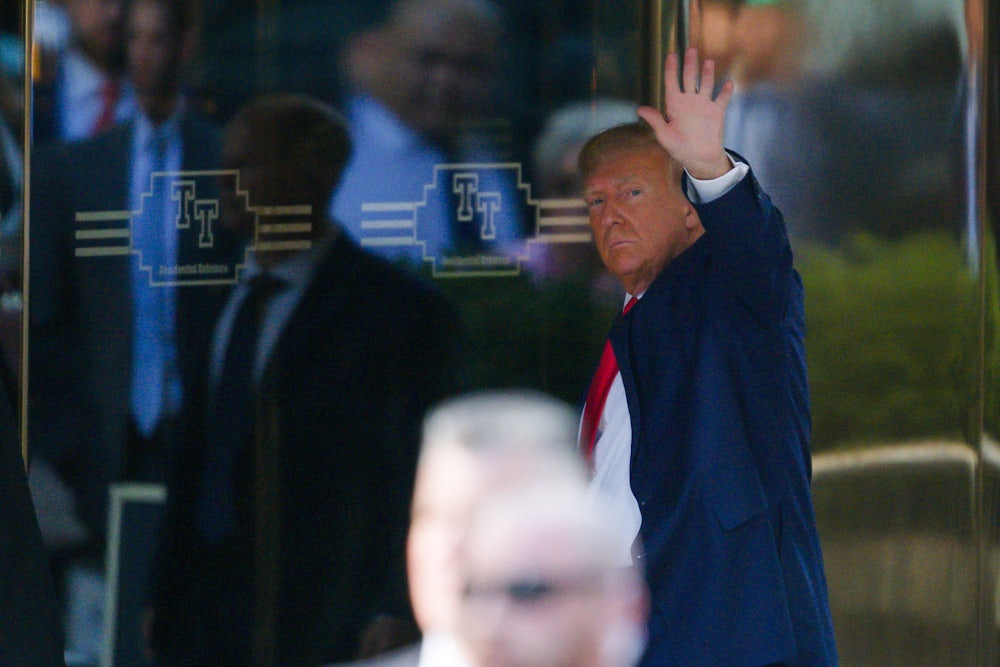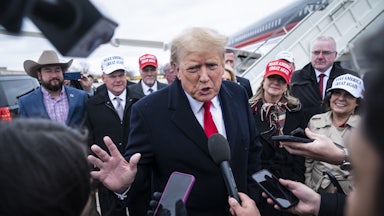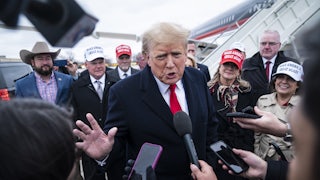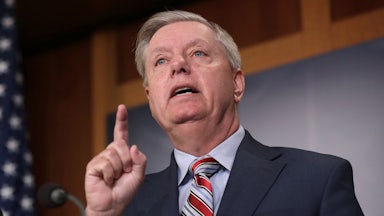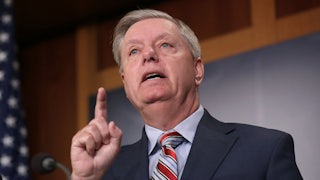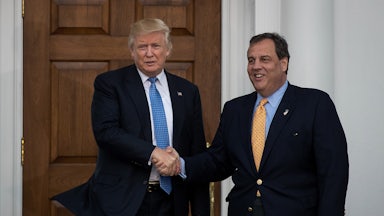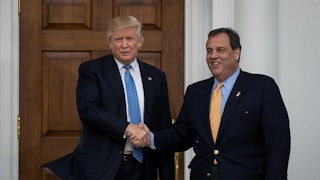In the early 2000s, I overheard two men discussing Italian politics as I sat at a café in Mondello, Sicily. “Can you believe it? They indicted Berlusconi again! Berlusconi has been hit with more than 20 indictments, and [Romano] Prodi not even one!” They clearly did not see the accumulation of criminal charges against Silvio Berlusconi as a measure of his and his business empire’s corruption. Instead, they saw the charges as a sign of the relentless persecution he had been exposed to. Similarly, his competitor Romano Prodi’s clean rap sheet was not a reflection of his relative probity but, on the contrary, an indication of his complicity with an even deeper form of corruption: a rigged political system.
I thought of this last week as the political commentariat debated Donald Trump’s indictment by Manhattan District Attorney Alvin Bragg—specifically, whether the charges would hurt, help, or have zero effect on the former president’s reelection bid. Berlusconi comparisons were once, back in 2016, a popular way of interpreting the Trump phenomenon. Now they may be due for a revival: Berlusconi’s long history as a criminal defendant might tell us what to expect in the Trump case.
At the time I overheard the two Sicilians talking, Berlusconi’s supporters, like Trump’s today, already occupied an alternate information universe, in which the usual parameters of judgment had been turned on their head: The growing mountain of evidence of Berlusconi’s criminal wrongdoing became the stigmata of martyrdom. But it is not entirely true that the various cases regarding Berlusconi and his associates had no impact on his roller-coaster political career.
Berlusconi began preparing the Italian public for his judicial troubles even before entering politics in 1993. Back in 1992, the massive corruption investigation known as Operation Clean Hands was decimating the governing political parties that had allowed Berlusconi to establish a virtual monopoly of private television in Italy. The investigations were edging dangerously close to Berlusconi’s companies, which, like many large Italian corporations, had paid handsome bribes to secure favors and advantages. During the summer of 1992, Berlusconi called together the leading figures of his media empire and made it clear that the days of editorial independence were over. “We must sing in harmony on the themes that interest us,” he told them. “You must understand that when we face the attacks of others against us, we must respond with concentrated fire of all our means against them and the aggression will stop.”
Berlusconi turned his vast editorial and TV empire into a formidable war machine. He summarily fired editors and executives who resisted and replaced them with attack-dog editors and TV personalities who anticipated the likes of Bill O’Reilly and Sean Hannity by several years. The magistrates who conducted Operation Clean Hands were, at this point, considered national heroes and among the most popular public figures in Italy. Suddenly, Berlusconi networks began portraying them as “red robes,” Communist judges pursuing a political strategy designed to place the heirs of the Italian Communist Party—which had, in fact, disbanded—in power. To put this in American terms: Without Trump owning the network directly, Fox News and its ilk are already playing a role similar to Berlusconi’s media empire’s, portraying Democrat District Attorney Alvin Bragg as part of a far-left conspiracy to reelect Joe Biden.
Berlusconi was elected prime minister in March 1994, and by summer the Milanese prosecutors were preparing to indict and arrest Paolo Berlusconi, Silvio’s brother, who had handled several bribes for his older brother’s companies. In late July, the Berlusconi government issued a decree essentially decriminalizing illegal party financing, making its order retroactive so that those arrested and convicted were suddenly released from prison. The decree was issued on the day that Italy won an important match in the World Cup. Jubilant Italian fans drove through the streets of Rome and other cities shouting, “Forza, Italia!” (Go, Italy!), which is both the team’s soccer chant and the name that Berlusconi gave to his own political party. It looked as if the entire country had come out in support of Berlusconi in the wake of the decriminalization decree.
But the tactic didn’t quite work. The images of notorious bribe-takers walking out of prison and the mass resignation of the Milan anti-corruption pool in protest of the decree forced a crisis. The government backed down, and Paolo Berlusconi was arrested on corruption charges. The judicial crisis prompted one of the parties in his government coalition—the Lombard League or Northern League—to withdraw its support for his government, forcing Berlusconi to step down as prime minister.
In the months leading up to the 1996 elections, evidence emerged that Berlusconi’s chief lawyer—and former defense minister—had kept several influential Roman judges on his payroll—accusations that would eventually be amply proven at trial. Berlusconi lost his second run at prime minister in 1996 in the midst of that scandal. But while the mounting evidence of criminal wrongdoing didn’t help, it would be hard to argue that he lost because of it. Far more consequential was that he was running in a smaller coalition without the Northern League. When he coaxed the Northern League back into his camp, Berlusconi won reelection in 2001—even though by this time, magistrates had been able to prove that hundreds of thousands of dollars were transferred from Berlusconi company accounts into the account of Berlusconi’s chief lawyer and then into the Swiss bank accounts of sitting judges. Another case showed Berlusconi bribing a senator to switch parties and bring down the Prodi government.
But by his time, the Berlusconi media empire had thoroughly politicized the criminal justice field. It had jumped on every blemish and peccadillo of the Italian judiciary, forcing the best-known and most popular member of the Milan anti-corruption pool, Antonio Di Pietro, to resign. And although Di Pietro eventually won a substantial settlement from Berlusconi’s daily newspaper Il Giornale for libeling him, Berlusconi had succeeded in his broader aim: removing the halo from the judges’ heads and making his judicial problems appear to be a war between himself and those who wanted to destroy him.
The never-ending cascade of scandals involving Berlusconi and his inner circle—numerous indictments, criminal investigations, evidence of bribery and fraud—seemed to exhaust Italians’ ability to experience outrage. Berlusconi has the disarming ability to appear to genuinely believe what he is saying even when he is recounting proven falsehoods. His troubles, paradoxically, kept him at the center of media attention, and so, for good or ill, he turned Italian politics into a 20-year reality TV show of which he was unquestionably the star. All of which is eerily similar to the problems posed by Trump in 2023.
But Berlusconi’s reign did ultimately come to an end—not through criminal cases but through his sheer incompetence and inability to govern. “Berlusconi is a disease that can be cured only with a vaccine, with a big injection of Berlusconi in the prime minister’s office … only after will we become immune,” Berlusconi critic journalist Indro Montanelli predicted in 2001. That immunity took quite a while to develop—two more stints as prime minister, from 2001 to 2006 and from 2008 to 2011. But the country did tire of him, eventually.
Berlusconi was always much more popular and effective when he was out of power than in power. When he was in office, Berlusconi seemed to lose interest, and he failed to produce the prosperity he promised. In fact, during Italy’s prolonged period of economic stagnation, the economy fared slightly better when his opposition governed. He was finally forced to resign during a major financial crisis in 2011, when soaring interest rates of Italian bonds threatened Italy’s basic financial stability. While scandals weren’t what brought him down, the endless drip-drip of embarrassing revelations regarding his increasingly unhinged behavior—his claiming in 2010 that an underage Moroccan stripper who attended his private parties was actually the niece of the president of Egypt—probably exacerbated the financial markets’ crisis of confidence, which is what eventually prompted the resignation.
So what larger lessons can we draw from this story that might help us navigate Trump’s legal difficulties?
There are, first of all, a few key differences between the two situations. Berlusconi benefited from a strange feature of the Italian criminal justice system, in which the criminal trial is followed by two automatic appeals, often drawing out cases over many years. Moreover, Italy is virtually the only country in which the statute of limitations clock is not stopped once judicial action commences. This means that many of the strongest cases against Berlusconi were thrown out because the statute of limitations had run out, even though he was convicted at trial and/or on the first appeal, allowing him to proclaim that despite his 20-plus criminal cases he had “never been convicted.” This allowed Berlusconi’s followers the margin of doubt they needed to continue believing in his alternate reality. (This streak ended in 2012 when he was finally convicted of tax fraud, a conviction that was confirmed the following year, preventing him from holding public office for five years and forcing him to resign from the Italian Senate.)
That said, the Berlusconi example suggests we shouldn’t expect Trump’s legal troubles to diminish his hold on his most dedicated followers. They may have the opposite effect, by allowing him to play the victim. This doesn’t mean that prosecutors should not proceed with cases against him if the evidence is strong. But there are a few features of the Stormy Daniels case being brought by the Manhattan District Attorney’s Office that offer cause for concern: Specifically, while the underlying story of Trump paying hush money to a porn star before the 2016 election is pretty straightforward, the legal basis on which the case rests is somewhat complicated and risky.
I would much prefer to see Trump prosecuted in Georgia for trying to overturn the 2016 election. Financial crimes, as Berlusconi’s case illustrates, are relatively easy to confuse the public about. But the attempt to tamper with the election was a crime akin to treason that cuts to the very essence of democracy. Prosecutors have a smoking gun in the form of a taped conversation in which Trump asks the Georgia secretary of state to “find 11,780 votes” and then threatens him when he resists. This is a case every American can understand, even Trump-leaning independents and moderate Republicans (some do still exist). Even if it will not win over the most fervent MAGA voters, it establishes for the official record that this actually happened.
There may yet prove to be another important difference between the Trump and Berlusconi cases. Berlusconi’s followers, never as fanatical as Trump’s, ultimately accepted the judgments of the judicial system, his conviction and ineligibility for public office. And they didn’t own AR-15s. Whatever the quirks of Italian political culture and the Italian criminal justice system that prolonged the Berlusconi saga, America’s potential for chaos may be greater still.
